‘Dreamer’ Cristian Arcega, featured in ‘Spare Parts,’ shares his story with first-year students
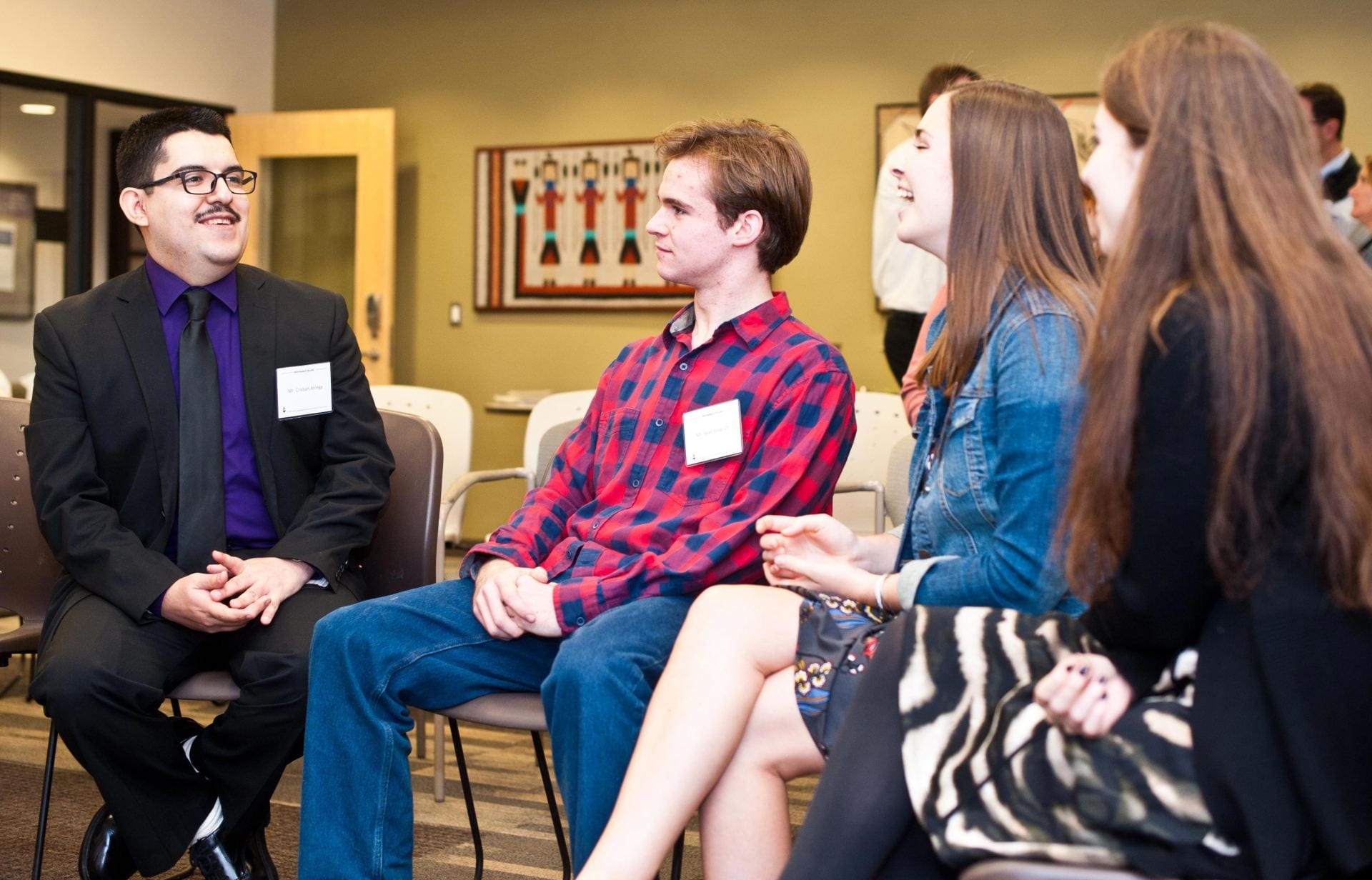
By Vicki-Ann Downing
First-year students participating in the Common Reading Program at Providence College had a rare opportunity — they heard the book’s author speak at Academic Convocation in August, then meet one of the main characters during New Student Family Weekend in October.
Cristian Arcega was one of four high school students featured in Spare Parts: Four Undocumented Teenagers, One Ugly Robot, and the Battle for the American Dream, a book by Joshua Davis. Arcega was the keynote speaker for New Student Family Weekend, Oct. 27-29, which drew more than 1,600 parents and family members to campus for theatre performances, athletic events, campus tours, panels about study abroad and career preparation, and more.
Arcega also shared lunch with winners of the Common Reading Program essay contest and participated in a Faculty Experts Discussion led by Dr. Joseph Cammarano, associate professor of political science and of public and community service studies.
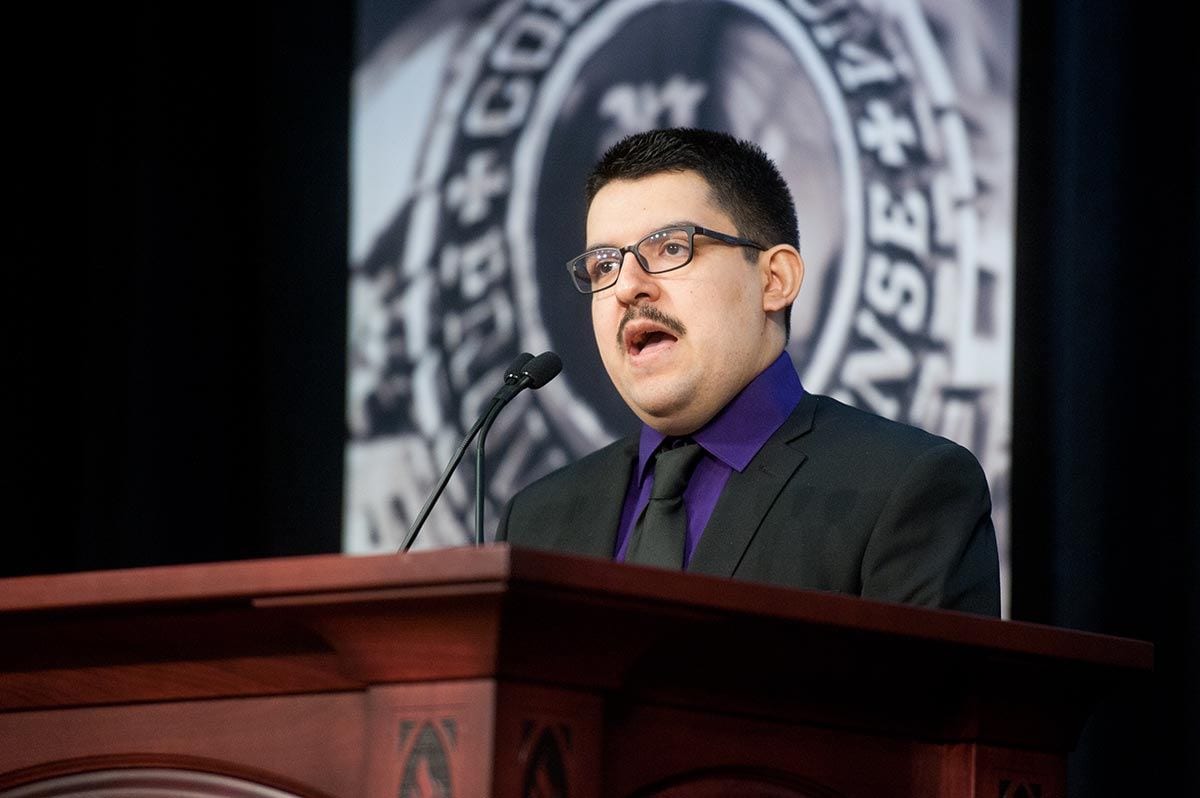
Arcega is a “dreamer” — an undocumented person granted temporary legal status under DACA, or Deferred Action for Childhood Arrivals. Created in 2012 by President Barack Obama, DACA gives people brought to the United States illegally as children the temporary right to live, study, and work in America. It was established after Congress failed to pass the Development, Relief and Education for Alien Minors (Dream) Act, which would have offered those same people the chance of permanent legal residency. President Donald Trump announced he will end DACA in March 2018 unless Congress takes action on immigration.
College President Rev. Brian J. Shanley, O.P. ’80 announced in September that the College would offer free legal services and cover the filing fees of students applying for DACA renewal before the Oct. 5 deadline. Counseling is also available to assist those students with any needs related to their immigration status, Father Shanley said.
Before Arcega’s address, Father Shanley told students and their families that he was impressed by the Spare Parts story because it showed students and teachers working together, and because of the “creativity and grit” the students demonstrated.
Using cheap materials they could repurpose or buy through fundraising in their community, Arcega and his classmates built a robot that won a national competition in 2004, defeating MIT students sponsored by Exxon. Faced with media attention, the students, all natives of Mexico, had to decide whether “to become the story everyone refers to when talking about immigration reform and the Dream Act,” Arcega said in his presentation.
“You have to put yourself out there to be vulnerable to have people pay attention to you,” said Arcega. “You have to work with whatever spare parts you have to be able to realize your dream.”
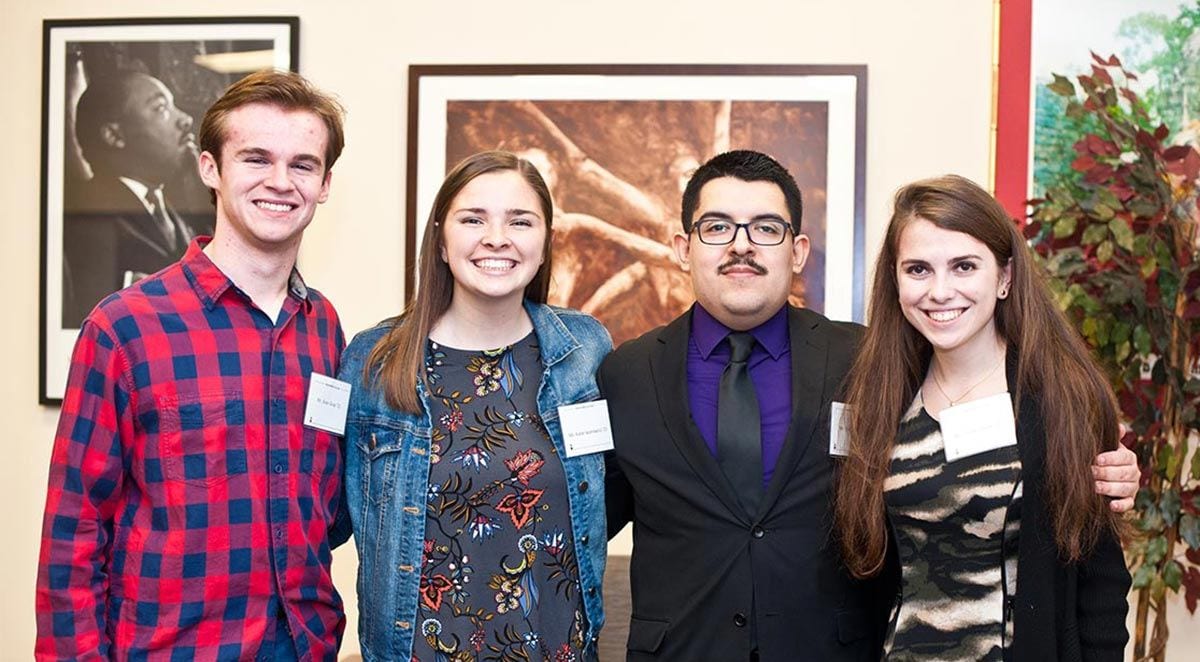
Claire Stover ’21 (Cheshire, Conn.), whose essay, “Spare Parts and the Fallacy of the American Dream,” won first prize in the Common Reading Program essay contest, met Arcega during lunch in Slavin Center. A biology major on a pre-med track, Stover said Arcega and the other students “were so smart, so gifted, I wanted them to have big careers.”
“I thought they would start companies in Silicon Valley, and it just didn’t happen,” said Stover. “These people seem smarter than a bunch of people I know who have all kinds of opportunities presented to them, so I got all fired up. I decided to write an essay highlighting this injustice. It’s a cause that really requires action.”
Her father, Jeffrey Stover, said he appreciated being able to hear Arcega.
“It’s sad that his story is even harder today than 10 years ago,” he said. “It’s difficult when you’re in harm’s way from a force like the U.S. government.”
Sean Gray ’21 (Lincoln, R.I.), a humanities major, won second prize for his essay, “Essential Parts,” and attended the lunch with his parents, Mark Gray ’78 and Julie Crowley Gray ’81.
Gray said Arcega’s uncertain immigration status “is ridiculous. It’s wrong. If you stick labels on people and hold them back because they don’t have paperwork, you’re really missing out.”
His mother also read the book and enjoyed meeting Arcega.
“I loved it. It’s timely. It’s just so important for now. And he’s got such a great personality to deliver the message,” she said. “He’s warm and he’s friendly and he’s approachable.
“To have a chance to speak one-on-one with him — that’s so PC.”
Katie Iwanowicz ’21 (Delmar, N.Y.), a political science major who was awarded third place for her essay, “American DREAMers,” said she asked Arcega how he feels about rhetoric used by Trump.
“He told me that hearing the type of language that the president has been using to describe undocumented immigrants is nothing new,” said Iwanowicz. “Back home in Arizona, this type of rhetoric is constantly being used against immigrants by those in political office. I am grateful to have had the opportunity to hear his perspective. Getting to meet Christian was an incredible experience.”
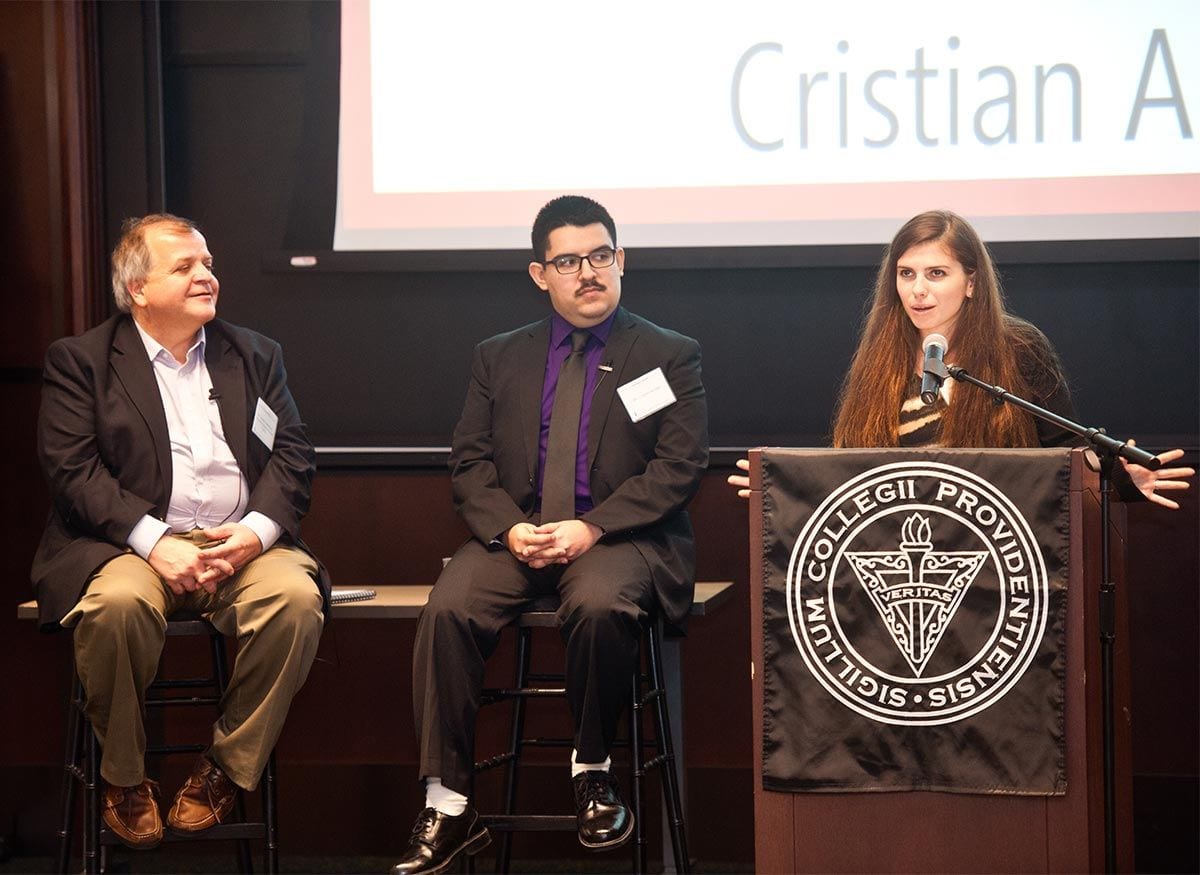
Arcega, who was 14 at the time of the national competition, is now 29. He has been recruited by interest groups and lobbyists to speak about immigration reform in Washington, D.C., and he attended a meeting at the White House. He has taken classes at a community college in Arizona, studied mechanical engineering at Arizona State University, studied computer engineering and electrical engineering at Western Michigan University, and attended mechanics school.
He has not yet earned a degree, but it is “only a matter of time,” he told Cammarano during the Faculty Experts Discussion. Arcega has withdrawn from college in the past because of a lack of residency and a lack of money to pay for courses. Through DACA, he has a work permit but cannot obtain health insurance.
If he had the same status as anyone else, “I would want to be able to have financial security to have a family and not worry about how my status would affect them,” Arcega said. “I would work for myself, have my own Silicon Valley-style company, do my own product designs. I can see myself at least trying. I would make a company as large as it could be to have influence, in political activism and helping our communities become better.”
Cammarano, who is using Spare Parts in two of his courses, Introduction to Politics and Service in Democratic Communities, talked with Arcega about community and what makes people feel welcome. Arcega, who has not visited Mexico since he was 7, said, “I sometimes don’t really feel that I belong any place. … I don’t feel wanted or even liked most of the time.”
“I’ve been all over the country, as far as Boston, Puerto Rico, south Texas, Seattle, Silicon Valley, Chicago, Florida, Michigan,” Arcega said. “We’re all really community. When I say ‘my community,’ I mean everybody who feels connected. That seems more limited than it should be in a nation of 50 states. If people feel there is something wrong in another portion of the country, they should be personally attached to it, because it is their country.”
To make students from other cultures feel welcome, it’s a good idea to offer them food from home and a chance to see their families, Arcega said.
“The modern Hispanic person is not that different from the modern Anglo teenager,” Arcega said. “Both are in the same culture, watch the same TV, like the same sports figures, the same politicians, listen to the same music and books.”
Arcega said the four students grew accustomed to being the subject of articles and films, including a movie, Spare Parts, based on the Davis book, and a documentary, Underwater Dreams, by filmmaker Mary Mazzio, which was shown during New Student Family Weekend.
“You get used to the idea that it’s never going to be quite right,” Arcega said. For one, he said, Davis is from San Francisco and Mazzio is from Boston, and “neither is Hispanic … they have different ways they approach media” based on where they have grown up. “I am tempted to write a paper about it.”
Asked to offer advice for students, Arcega said, “Just do something new. Not necessarily something you like or expect to do well in. Learn from failure and disappointment. It’s the only way I’ve known how to grow.”
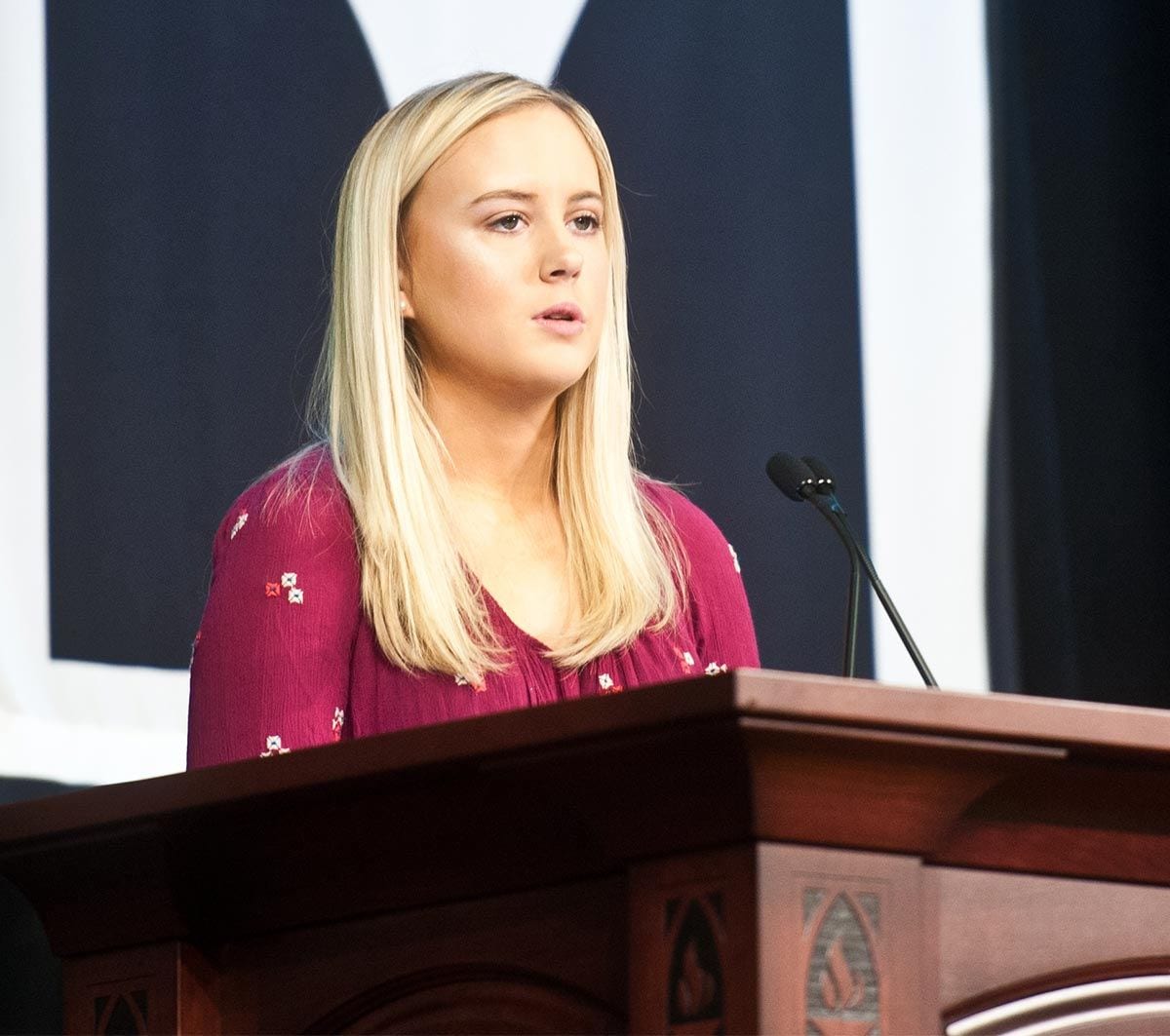
During the welcome program in Peterson Recreation Center, Emily Powers ’21 (East Providence, R.I), president of the first-year class and a psychology major, spoke to first-year students and their families. She said she visited 13 colleges before selecting PC. She discovered that “Friars hold doors.”
“There is a place for everybody here,” Powers said.
Father Shanley urged parents not to worry about their child’s choice of a major. Increasingly, students in the United States are being urged to study something “practical, that you’re going to get a job with, or think you’re going to get a job with,” he said.
“I majored in history, I have two graduate degrees in theology and a Ph.D. in philosophy, and I run a big business — Providence College,” Father Shanley said. “You can do anything with your education here. Art majors can do all kinds of things. English majors can do anything. History majors can run companies. Please encourage your children to follow their passions. Their passions will lead them to where God wants them to go.”





